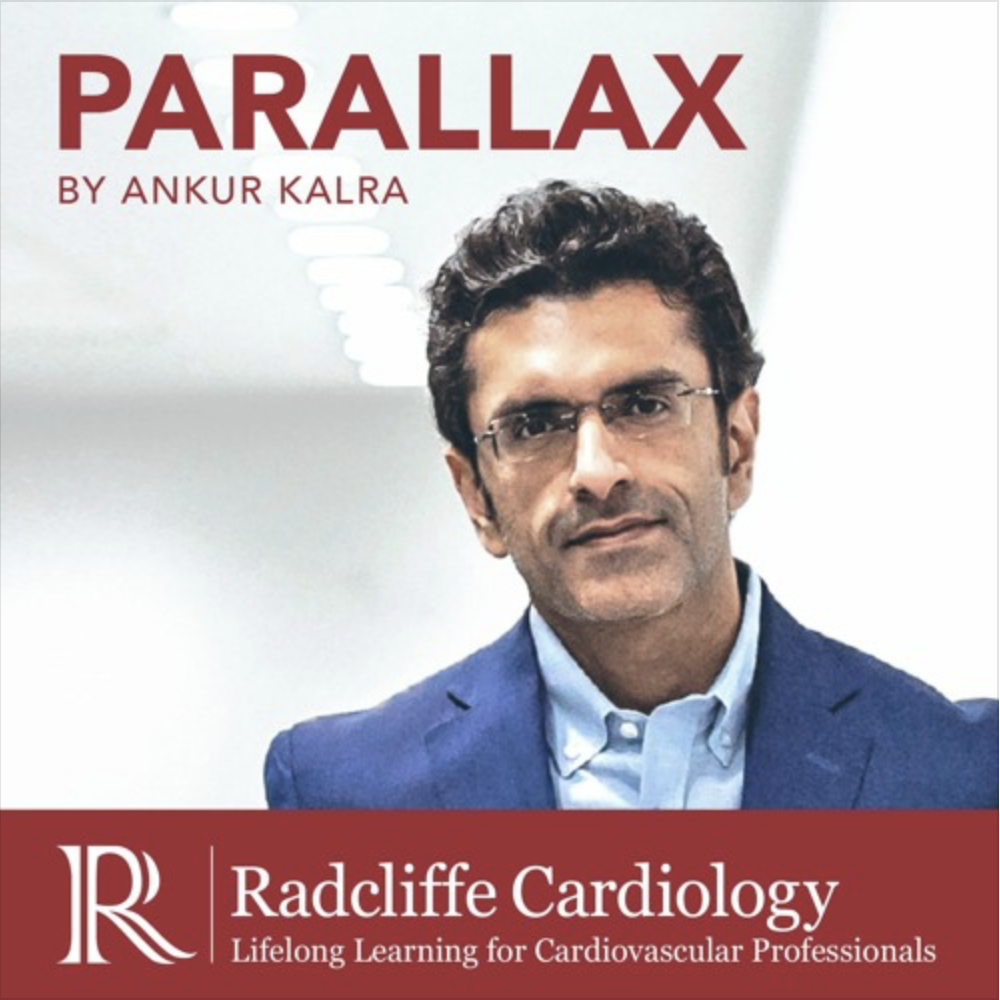
10: 2/3 Burnout & Resilience With Kavitha Chinnaiyan: How Mindfulness And The Ego Interact
What does mindfulness have to do with burnout? Is our definition of success driving our stress and anxiety? How can we channel our ego into something positive?
In our second episode on burnout and resilience, Kavitah Chinnaiyan, MD, and Ankur take a deeper dive into mindfulness and training the brain to move from Default-Mode to Task-Positive Networks. Kavitah is an award-winning author and, Cardiologist and Director of Cardiac CT Research at Beaumont Health, MI. Send us your thoughts to this episode for Ankur to share in future episodes: podcast@radciffe-group.com. Guest @ChinnaiyanMD.
Hosted by @AnkurKalraMD. Produced by @RadcliffeCARDIO.
Read MoreRead Less
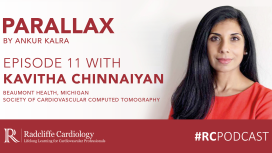
What are the key pillars of self-care and what do dirty windshields have to do with it? How can you take meditation “off the matt”? What has chronobiology and Ayurveda taught us about working with, rather than against, our circadian rhythm?
In the final episode of our burnout and resilience series, Kavitha and Ankur give you some practical tools of self-care to help you avoid burnout. Kavitah Chinnaiyan, MD, is an award-winning author and, Cardiologist and Director of Cardiac CT Research at Beaumont Health, MI. Send us your thoughts to this episode for Ankur to share in future episodes: podcast@radciffe-group.com. Guest @ChinnaiyanMD.
Hosted by @AnkurKalraMD. Produced by @RadcliffeCARDIO.
Read More
In the final episode of our burnout and resilience series, Kavitha and Ankur give you some practical tools of self-care to help you avoid burnout. Kavitah Chinnaiyan, MD, is an award-winning author and, Cardiologist and Director of Cardiac CT Research at Beaumont Health, MI. Send us your thoughts to this episode for Ankur to share in future episodes: podcast@radciffe-group.com. Guest @ChinnaiyanMD.
Hosted by @AnkurKalraMD. Produced by @RadcliffeCARDIO.
All Episodes
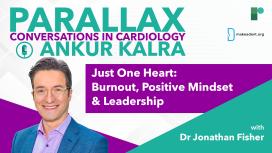
Tune in for a rich discussion with Dr Jonathan Fisher and Dr Ankur Kalra on the future of healthcare, well-being, and rediscovering the human connection at the heart of medicine. Find out more about the bestselling book Just One Heart: A Cardiologist’s Guide to Healing, Health, and Happiness.
Read More
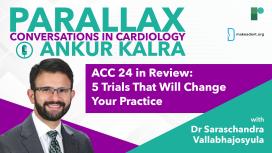
Dr Kalra and Dr Vallabhajosyula dissect the practical implications of the top 5 ACC.24 trials, answering pressing questions and addressing emerging dilemmas.
Read More
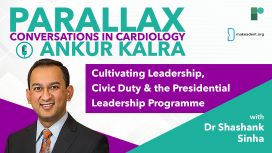
In this episode, Dr Sinha shares his insights on leadership after participating in the prestigious Presidential Leadership Scholars Programme.
Read More
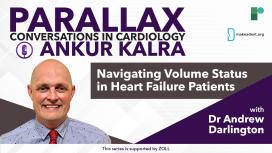
In this informative episode of Parallax, Dr Ankur Kalra is joined by Dr Andrew Darlington, an Advanced Heart Failure Cardiologist at Piedmont Heart Institute in Georgia.
Together, Dr Kalra and Dr Darlington delve into the significance of assessing volume status in patients with heart failure, highlighting its continued relevance in 2024, including the availability of new diagnostic tools, including the Heart Failure Management System (HFMS).
This series is supported by ZOLL and is intended for Health Care Professionals.
Read More
Together, Dr Kalra and Dr Darlington delve into the significance of assessing volume status in patients with heart failure, highlighting its continued relevance in 2024, including the availability of new diagnostic tools, including the Heart Failure Management System (HFMS).
This series is supported by ZOLL and is intended for Health Care Professionals.
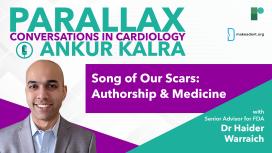
In this week's Parallax episode, Dr Ankur Kalra welcomes Dr Haider Warraich, a cardiologist at Brigham and Women's Hospital. Dr Warraich is not only a Senior Advisor for Chronic Disease to the FDA Commissioner but also a prolific author, having written three books, including "Song of Our Scars: The Untold Story of Pain." He is a regular contributor to publications like the New York Times and the Washington Post.
Read More
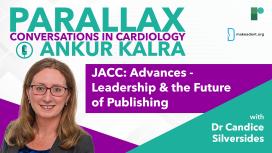
Dive into the unique synergy between her clinical practice and editorial leadership as Dr Silversides shares her vision for the journal. Learn how she navigates diverse responsibilities, manages peer reviews, and ensures fair evaluation of the submitted manuscripts. Get insights into launching a journal, from adapting to the needs of the readership and editorial board selection to time management. Dr Silversides joins Dr Kalra in exploring the evolving landscape of academic publishing, discussing the challenges and opportunities presented by AI and other advancements.
Read More
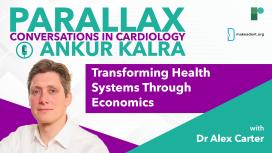
The podcast embarks on an exploration of the program's three fundamental pillars: health economics, outcomes measurement, and management. Dr. Carter underscores the importance of efficiently allocating scarce resources, evaluating health system performance through population outcomes, and translating theoretical knowledge into practical application through leadership.
Read More
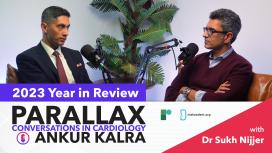
Dr Ankur Kalra welcomes back Dr Sukhjinder Nijjer for their much-anticipated annual review of advancements in cardiovascular medicine that defined the year 2023.
Read More
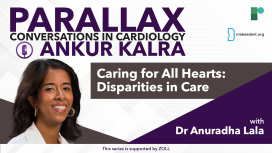
In this thought-provoking episode, Dr Ankur Kalra is joined by Dr Anuradha Lala. They delve into the critical topic of disparities in care within the healthcare system from a cardiologist's point of view and explore actionable steps towards a more inclusive and fair healthcare landscape.
This series is supported by ZOLL and is intended for Health Care Professionals.
Read More
This series is supported by ZOLL and is intended for Health Care Professionals.
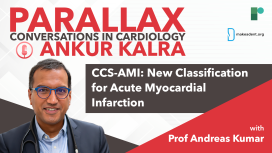
In this informative episode, Dr Kumar shares what led his team and the CCS to introduce a new classification scheme for acute MI. He discusses how research from the past 15 years highlighted the need to incorporate tissue changes resulting from acute myocardial infarction (MI) into clinical practice. Dr Kumar outlines the four stages of CCS-AMI, and we gain insight into how this novel classification scheme could impact bedside medicine.
Read More
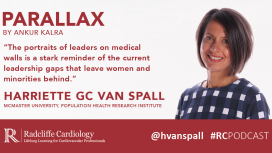
Following the recent controversy surrounding physician portraits displayed in medical hallways, Ankur spoke to Harriette GC Van Spall MD to unpick this hot topic brought back to life by a recent article penned by Jeffrey Flier (former Dean of Harvard Medical School) in The Boston Globe.
Harriette is an Associate Professor of Medicine at the Department of Medicine, Cardiology and the Department of Health Research Methods, Evidence and Impact at McMaster University and the Population Health Research Institute in Hamilton, ON, Canada. In this episode, Ankur and Harriette discuss why this issue is so contentious, what the current state of medical walls represents, why this may be an issue and what alternative medical walls could look like. Harriette also shares her thoughts on how this topic relates to the maintenance of hierarchical power structures in academic institutions, calling for more collaborative leadership and management styles. Guest @hvanspall.
Hosted by @AnkurKalraMD. Produced by @RadcliffeCARDIO.
Read More
Harriette is an Associate Professor of Medicine at the Department of Medicine, Cardiology and the Department of Health Research Methods, Evidence and Impact at McMaster University and the Population Health Research Institute in Hamilton, ON, Canada. In this episode, Ankur and Harriette discuss why this issue is so contentious, what the current state of medical walls represents, why this may be an issue and what alternative medical walls could look like. Harriette also shares her thoughts on how this topic relates to the maintenance of hierarchical power structures in academic institutions, calling for more collaborative leadership and management styles. Guest @hvanspall.
Hosted by @AnkurKalraMD. Produced by @RadcliffeCARDIO.

In celebration of this month’s ‘National Eat Your Vegetables Day’, this week’s guest is @TheVeggieMD, one of the most prominent physicians on social media! Dr Danielle Belardo MD is a Cardiology Fellow, American Board of Internal Medicine certified and a member of the American College of Cardiology Nutrition and Lifestyle Sub-Committee.
In this episode, Ankur and Danielle speak about the evidence in favour of a whole-food plant-based diet to improve cardiovascular health, the ACC prevention guidelines, how to talk to patients about positive dietary change, the issue of lack of nutrition training in cardiovascular fellowships and what Danielle’s diet looks like as a busy whole-food plant-based cardiology fellow. On her own podcast ‘Nutrition Rounds’ Danielle has discussions about evidence-based plant-based nutrition with physicians who are leading experts in nutrition and health.
Hosted by @AnkurKalraMD. Produced by @RadcliffeCardiology.
Read More
In this episode, Ankur and Danielle speak about the evidence in favour of a whole-food plant-based diet to improve cardiovascular health, the ACC prevention guidelines, how to talk to patients about positive dietary change, the issue of lack of nutrition training in cardiovascular fellowships and what Danielle’s diet looks like as a busy whole-food plant-based cardiology fellow. On her own podcast ‘Nutrition Rounds’ Danielle has discussions about evidence-based plant-based nutrition with physicians who are leading experts in nutrition and health.
Hosted by @AnkurKalraMD. Produced by @RadcliffeCardiology.

Listen to our first episode with two guests! Ankur spoke with Emmanouil S Brilakis, MD and Michael Megaly, MD from the Minneapolis Heart Institute, Abbott Northwestern Hospital about their article on the role of drug-coated balloons in small-vessel coronary artery disease (SVD) published in US Cardiology Review 13.1. Percutaneous coronary intervention of SVD remains challenging due to difficulties with device delivery and high restenosis rate, making drug-coated balloons an attractive emerging option in patients with SVD.
In this brilliant conversation, Ankur, Emmanouil and Michael unravel the potential advantages, challenges and practical realities of using drug-coated balloons in SVD, and the findings of the latest randomised controlled trials studying this area.
Hosted by @AnkurKalraMD. Produced by @RadcliffeCardiology. [Disclaimer: The use of drug-coated balloons in coronay intervention is still off-label; it has not been approved by the FDA.]
Read More
In this brilliant conversation, Ankur, Emmanouil and Michael unravel the potential advantages, challenges and practical realities of using drug-coated balloons in SVD, and the findings of the latest randomised controlled trials studying this area.
Hosted by @AnkurKalraMD. Produced by @RadcliffeCardiology. [Disclaimer: The use of drug-coated balloons in coronay intervention is still off-label; it has not been approved by the FDA.]

We have observed a lot of developments in percutaneous coronary intervention (PCI) over the past 12 months with the publication of various studies and trials. This week, Ankur spoke with J. Dawn Abbott, MD, Associate Professor of Cardiology at Warren Medical School of Brown University about her recently published US Cardiology Review 13.1 article on the significant developments in PCI over the past 12 months.
Dawn is an associate editor of the journal Circulation: Cardiovascular Interventions and is widely known for her research program on PCI and peripheral arterial disease (PAD). Ankur and J. Dawn discuss multiple trials/studies that were published in 2018, including ORBITA, PIONEER-II and ABSORB. J. Dawn also shares her thoughts on the latest stent technologies.
Hosted by @AnkurKalraMD. Produced by @RadcliffeCardiology.
Read More
Dawn is an associate editor of the journal Circulation: Cardiovascular Interventions and is widely known for her research program on PCI and peripheral arterial disease (PAD). Ankur and J. Dawn discuss multiple trials/studies that were published in 2018, including ORBITA, PIONEER-II and ABSORB. J. Dawn also shares her thoughts on the latest stent technologies.
Hosted by @AnkurKalraMD. Produced by @RadcliffeCardiology.

This week’s podcast guest needs no introduction! Prof Athena Poppas is one of the most widely known cardiologists in the US and current Vice-President of the American College of Cardiology! Ankur spoke to Athena about her recently published US Cardiology Review 13.1 article on whether early management of hypertension by GPs can improve outcomes.
They discuss the importance of preventative medicine, their experience of reducing hypertension with non-pharmaceutical and pharmaceutical methods, and the significance of the integrated “team approach” when treating comorbid conditions such as hypertension. Athena also shares her thoughts on cardiologists’ responsibility to shape their patients’ lifestyle choices.
Hosted by @AnkurKalraMD. Produced by @RadcliffeCardiology.
Read More
They discuss the importance of preventative medicine, their experience of reducing hypertension with non-pharmaceutical and pharmaceutical methods, and the significance of the integrated “team approach” when treating comorbid conditions such as hypertension. Athena also shares her thoughts on cardiologists’ responsibility to shape their patients’ lifestyle choices.
Hosted by @AnkurKalraMD. Produced by @RadcliffeCardiology.





